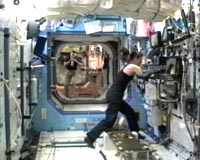 |
Moscow (AFP) April 8, 2011 Fifty years after Yuri Gagarin's historic flight, Russia still prides itself on launching more satellites than anyone else and will soon have full responsibility for taking Americans into space. But although Russia will this year enjoy the delicious historical irony of providing the only means for launching US astronauts, its own modern space programme has been characterised by a lack of ambition in the last years. It remains decades since Moscow sent probes to the moon and Mars. In recent months a string of high-profile problems have raised questions about the reliability of launch systems that are little changed from the Cold War era. "There is money for the space programme," said Igor Marinin, the editor-in-chief of the influential Russian Novosti Kosmonavtiki journal. "But the programme is not ambitious and its goals are modest. It will not take us into the leading position in space exploration. We need to have a more ambitious programme." The Russian space programme -- which in the Cold War benefited from being a political project -- suffered a dwindling of funding in the post-Soviet era, forcing it to offer launch seats to high-paying space "tourists". The budget of Russian space agency Roskosmos is 94.3 billion rubles (3.2 billion dollars), a relatively paltry sum compared to the 19 billion dollar budget of NASA. Moscow's last probe to the moon was Luna-24 which returned a soil sample in August 1976. Post-Soviet Russia's inter-planetary exploration plans suffered a major blow in 1996 when its Mars-96 probe failed to enter orbit and broke up. It has not launched any inter-planetary probe since. Russia in 2001 brought down the Mir space station -- another great Soviet space project -- and instead pooled its resources with its former Cold War foes to build the International Space Station (ISS). But under strongman Russian leader Vladimir Putin, Roskosmos' financial fortunes have improved considerably and its budget is already double what it was in 2008. Russia is scheduled later this year to finally launch its much-delayed Fobos-Grunt probe to visit the Martian moon Phobos. It is also scheduling lunar exploration probes in 2012 and 2013. "If we accept an ambitious cosmic programme and finance it fully, there will be very good results and we will return to the leading position," said Marinin. There is also no question about Russia's leading position on the lucrative world satellite-launching market, with 48 launches scheduled for 2011, even more than 2010. With the United States withdrawing its shuttles after two more flights this year, Russia's simpler launch system for manned space flight will become the sole means for taking humans to the ISS. The principles of Russia's Soyuz launch system -- developed in the 1960s and based on the Vostok rocket that took Gagarin to space -- have changed little since the Cold War. Marinin emphasised this does not mean Russia is using ancient technology. "The appearance of the rocket has not changed in four decades but inside there are new modifications and it's quite different to 40 years ago." But Russia's approach to the Gagarin anniversary has not been smooth and in December it suffered one of its most embarrassing space mishaps of recent years when three navigation satellites crashed into the ocean after launch. Meanwhile, the launch of two Russians and an American from the Russian-rented Baikonur cosmodrome in Kazakhstan for the ISS was delayed by a week due to a technical problem before the successful lift-off on Tuesday. The delay exasperated top officials who had planned on being in Baikonur to witness the anniversary launch at first hand, prompting renewed pressure for the resignation of the space agency's chief Anatoly Perminov.
Share This Article With Planet Earth
Related Links Space Tourism, Space Transport and Space Exploration News
 Deep-Space Travel Could Create Heart Woes For Astronauts
Deep-Space Travel Could Create Heart Woes For AstronautsBirmingham AL (SPX) Apr 08, 2011 Astronauts anticipate more trips to the moon and manned missions to Mars. But exposure to cosmic radiation outside the Earth's magnetic field could be detrimental to their arteries, according to a study by University of Alabama at Birmingham researchers published April 6, 2011, online in the journal Radiation Research. Using an animal model, researchers assessed the affect of iron ion radi ... read more |
|
| The content herein, unless otherwise known to be public domain, are Copyright 1995-2010 - SpaceDaily. AFP and UPI Wire Stories are copyright Agence France-Presse and United Press International. ESA Portal Reports are copyright European Space Agency. All NASA sourced material is public domain. Additional copyrights may apply in whole or part to other bona fide parties. Advertising does not imply endorsement,agreement or approval of any opinions, statements or information provided by SpaceDaily on any Web page published or hosted by SpaceDaily. Privacy Statement |